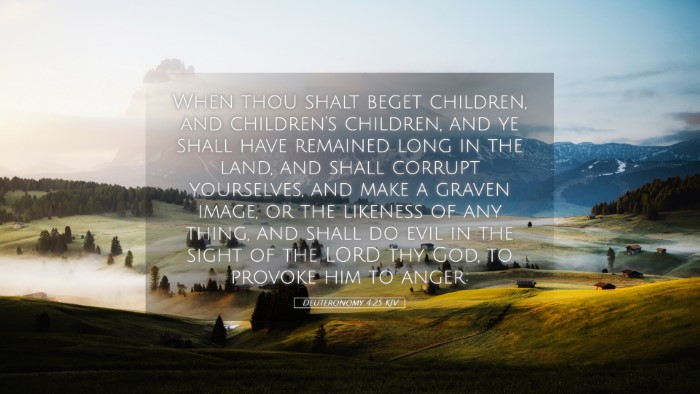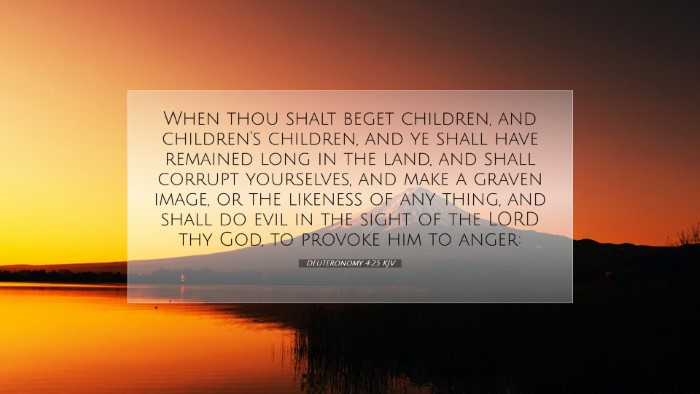Commentary on Deuteronomy 4:25
Verse Reference: Deuteronomy 4:25
Verse Text: "When thou shalt beget children, and children’s children, and ye shall have remained long in the land, and shall corrupt yourselves, and make a graven image, or the likeness of any thing, and shall do evil in the sight of the LORD thy God, to provoke him to anger."
Introduction
This verse serves as a powerful warning directed towards the people of Israel regarding the consequences of their actions, particularly the act of idolatry. It reflects the deep concern of Moses for the spiritual integrity of the community as they settle into the Promised Land. The verse also emphasizes the generational impact of sin, highlighting the responsibility of individuals and families in maintaining faithfulness to the covenant established with God.
Exegesis and Insights from Commentaries
Matthew Henry's Commentary
Matthew Henry emphasizes the context of the passage within the broader message of Deuteronomy. He notes that the warnings given by Moses are both practical and prophetic. The mention of "children" indicates the lasting implications of their fidelity or infidelity to God. Henry further comments on the phrase "and shall corrupt yourselves,” indicating that moral corruption begins subtly and can escalate to grievous sin if unchecked.
He asserts that idolatry is not merely a physical act of worshipping graven images but represents a wider spiritual departure from the living God. Henry calls attention to the seriousness of provoking God to anger and outlines the notion that every generation is accountable for its spiritual health. He warns that negligence in spiritual matters can lead to a cycle of sin that encompasses future generations.
Albert Barnes' Notes on the Bible
Albert Barnes expands on the implications of the verse by focusing on the phrase "when thou shalt beget children, and children’s children.” He suggests that this reflects the natural progression and the importance of nurturing faith within families. Barnes posits that the Jews were to consider their children’s future and the spiritual legacy they left behind.
The term "graven image" resonates deeply in his commentary as he highlights that it symbolizes not only the rejection of God’s sovereignty but also a vulnerability to cultural influences. Barnes warns that such actions provoke divine anger and lead to serious consequences, including exile and suffering.
Barnes also discusses the significance of long tenure in the land and how prosperity could lead to complacency. He cautions that blessings should encourage gratitude and obedience, not lead to idolatry and license.
Adam Clarke's Commentary
Adam Clarke provides a thorough examination of the text, drawing attention to the covenantal relationship between Israel and God. He interprets the warning in light of the historical context of Israel’s journey and the anticipated challenges they would face in Canaan.
Clarke notes that “shall corrupt yourselves” speaks to the inherent capability of the people to stray away from divine commands. He categorizes idolatry as a fundamental breach of their covenant with God, highlighting that it incurs both individual and collective guilt.
He also interprets the “graven image” as reflecting a deep-seated human tendency towards materialism and the worship of created things instead of the Creator. Clarke stresses the dire consequences of such actions, particularly in provoking God’s anger, illustrating that divine patience has boundaries that, once crossed, result in turmoil.
Theological Implications
The theological ramifications of Deuteronomy 4:25 are profound. This verse serves as a reminder of the covenantal obligations of Israel and the necessity of maintaining purity in worship. It is a cautionary note about the dangers of allowing cultural practices to seep into the faith life of the community.
Furthermore, the generational aspect emphasizes the continuity of faith. Each generation inherits the responsibility to uphold the values and teachings passed down from their forebears. The loss of this commitment inevitably leads to moral decay and spiritual decline.
Applications for the Modern Believer
The insights drawn from this verse can be beneficial for contemporary believers, particularly in understanding their role in preserving their faith and the faith of their children. The verse serves as a reminder to be vigilant against modern forms of idolatry, be it in the form of materialism, secularism, or societal pressures that stand in opposition to God’s commands.
- Faithful Parenting: It emphasizes the need for intentional discipleship within families.
- Awareness of Cultural Influences: Believers must remain aware of how cultural norms can shape their spiritual practices.
- Generational Responsibility: Each generation is tasked with the duty to carry forth the teachings of Christ and resist the temptations to conform to worldly standards.
- Promoting a Culture of Worship: Gathering for worship and fostering a community centered on God’s Word and His commandments safeguards against corruption.
Conclusion
Deuteronomy 4:25 encapsulates the essence of vigilance and loyalty to God amidst the challenges of everyday life. The commentaries of Henry, Barnes, and Clarke collectively underscore the importance of this passage in both its historical context and its timeless relevance. Pastors, theologians, and laypersons alike are encouraged to delve into the depths of this text, recognizing the weight of generational consequences and the call to uphold the integrity of faith in an ever-changing world.


